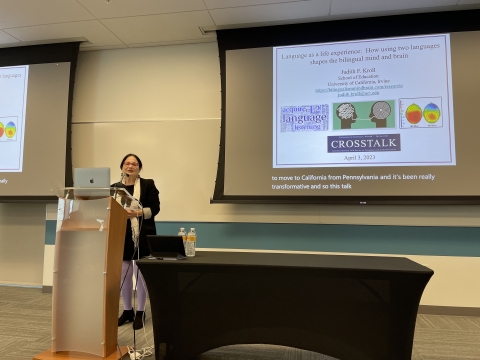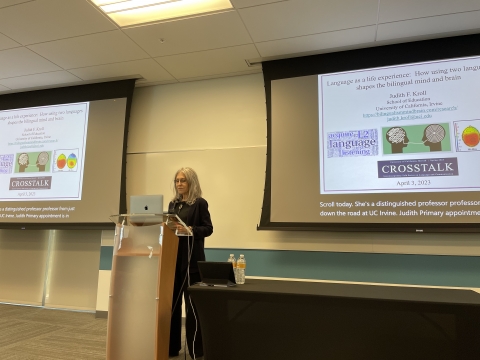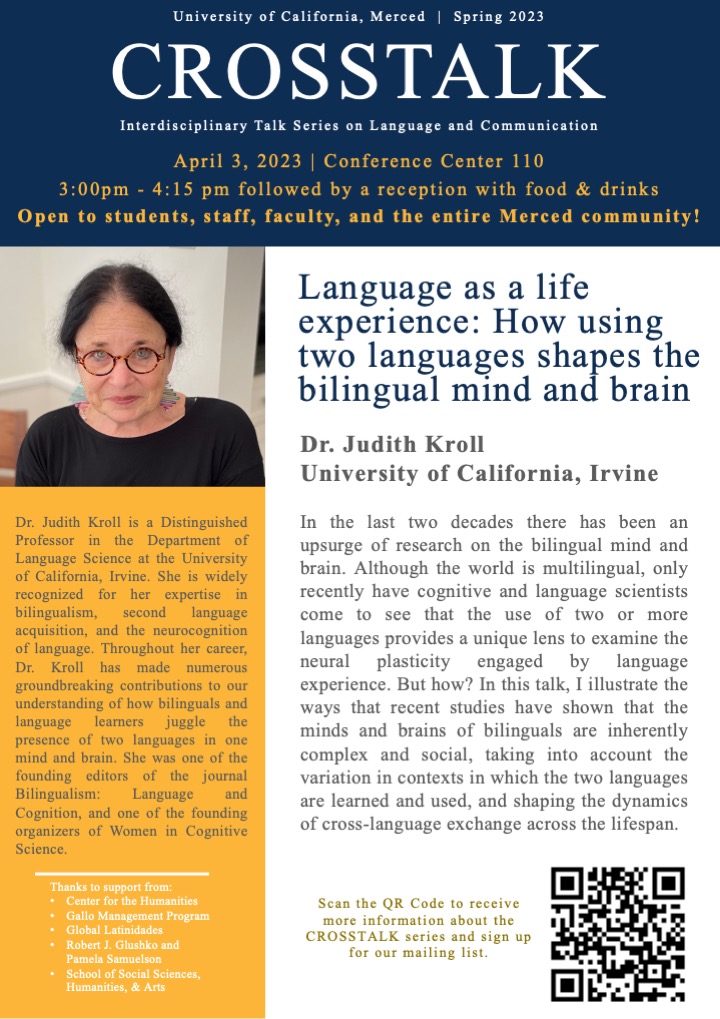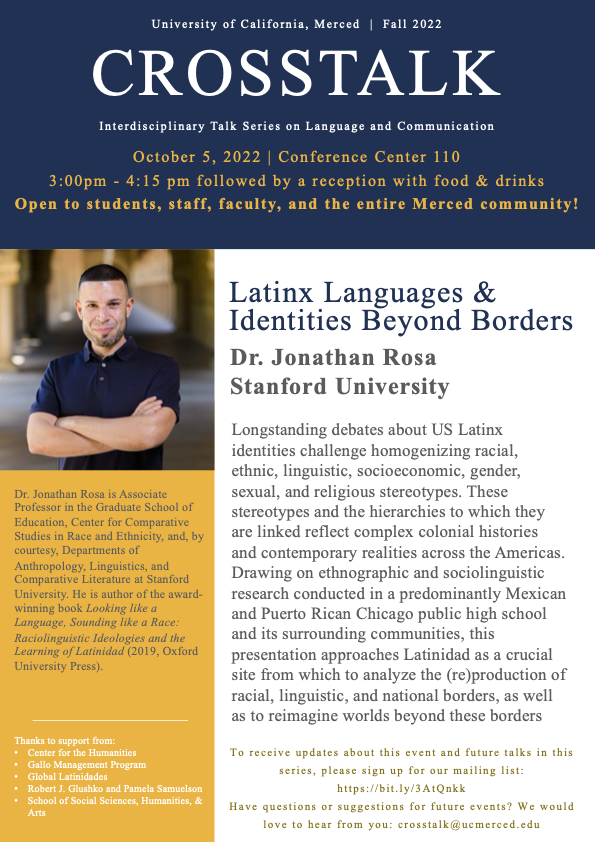Fall 2023 Event
Dr. Edward Maibach (George Mason University) on The power of health professionals to build public and political will for equitable climate solutions
Date: October 25th, 2023
Time: 3pm-4:30pm (followed by a reception with food & drinks)
Location: Conference Center 110

Abstract: Climate change and its underlying primary cause—burning fossil fuels—are arguably the world’s leading causes of preventable death and ill health. Accelerating the decarbonization of the nation’s and world’s energy supplies, and limiting global warming to the extent possible, are profound public health imperatives. Fortunately, audience research finds that physicians, nurses, and other health professionals are among the trusted types of professionals by the public and policymakers, and message research finds that communicating about the human health relevance of climate change can play a pivotal role in building public and political will for climate solutions. In this talk, Dr. Maibach will review this research and discuss efforts in the health community to rise to both the challenge and the opportunity.
Bio: Edward Maibach, MPH, PhD is a Distinguished University Professor and Director of the Center for Climate Change Communication at George Mason University. His research illuminates public understanding of climate change and strategies for enhancing it. Ed is a Fellow of the American Academy for the Advancement of Science, a Member of the National Academy of Medicine, and he serves on the Board of Directors of the Global Climate and Health Alliance. He has previously served as the Worldwide Director of Social Marketing at Porter Novelli and Associate Director of the National Cancer Institute.
Spring 2023 Event
Dr. Judith Kroll (UC Irvine) on Language as a life experience: How using two languages shapes the bilingual mind and brain
Date: April 3rd, 2023
Time: 3pm-4:15pm (followed by a reception with food & drinks)
Location: Conference Center 110
Abstract: In the last two decades there has been an upsurge of research on the bilingual mind and brain. Although the world is multilingual, only recently have cognitive and language scientists come to see that the use of two or more languages provides a unique lens to examine the neural plasticity engaged by language experience. But how? It is now uncontroversial to claim that the bilingual’s two languages are continually active, creating a dynamic interplay across the two languages. But there continues to be controversy about the consequences of that cross-language exchange for how cognitive and neural resources are recruited when a second language is learned and used actively and whether native speakers of a language retain privilege in their first acquired language. In the earliest months of life, minds and brains are tuned differently when exposed to more than one language from birth. That tuning has been hypothesized to open the speech system to new learning. For the oldest bilingual adults, there is evidence that a life of being bilingual confers protections against cognitive decline. In this talk, I illustrate the ways that recent studies have shown that the minds and brains of bilinguals are inherently complex and social, taking into account the variation in contexts in which the two languages are learned and used, and shaping the dynamics of cross-language exchange across the lifespan.
Bio: Judith Kroll is a Distinguished Professor in the Department of Language Science at the University of California, Irvine. She completed her undergraduate degree at New York University and graduate degrees at Brandeis University. She held faculty positions at Swarthmore College, Rutgers University, and Mount Holyoke College before joining the Penn State faculty in 1994, and moved her lab to UCR in 2016, and recently to UCI in 2019.
The research that she and her students conduct concerns the way that bilinguals juggle the presence of two languages in one mind and brain. Their work, supported by grants from NSF and NIH, shows that bilingualism provides a tool for revealing the interplay between language and cognition that is otherwise obscure in speakers of one language alone.
With colleagues at Penn State, she is PI on a PIRE grant (Partnerships for International Research and Education) from NSF to develop an international research network and program of training to enable language scientists at all levels (undergraduate, graduate, and postdoctoral) to pursue research abroad on the science of bilingualism.
She is a Fellow of the AAAS, the APA, the APS, the Psychonomic Society, and the Society of Experimental Psychologists. She was one of the founding editors of the journal Bilingualism: Language and Cognition (Cambridge University Press), and one of the founding organizers of Women in Cognitive Science, a group developed to promote the advancement of women in the cognitive sciences and supported by NSF.


Fall 2022 Event
Dr. Jonathan Rosa on Latinx Languages & Identities Beyond Borders
Date: October 5th, 2022
Time: 3pm-4:15pm (followed by a reception with food & drinks)
Location: Conference Center Room 110
Abstract: Longstanding debates about US Latinx identities challenge homogenizing racial, ethnic, linguistic, socioeconomic, gender, sexual, and religious stereotypes. These stereotypes and the hierarchies to which they are linked reflect complex colonial histories and contemporary realities across the Americas. Drawing on ethnographic and sociolinguistic research conducted in a predominantly Mexican and Puerto Rican Chicago public high school and its surrounding communities, this presentation approaches Latinidad as a crucial site from which to analyze the (re)production of racial, linguistic, and national borders, as well as to reimagine worlds beyond these borders.
Bio: Jonathan Rosa is Associate Professor in the Graduate School of Education, Center for Comparative Studies in Race and Ethnicity, and, by courtesy, Departments of Anthropology, Linguistics, and Comparative Literature at Stanford University. Dr. Rosa is also Director of Stanford’s Program in Chicanx-Latinx Studies and Co-Director of the Center for Global Ethnography, as well as President of the Association of Latina/o and Latinx Anthropologists of the American Anthropological Association. He is author of the award-winning book Looking like a Language, Sounding like a Race: Raciolinguistic Ideologies and the Learning of Latinidad (2019, Oxford University Press) and co-editor of the volume Language and Social Justice in Practice (2019, Routledge). His work has appeared in scholarly journals such as the Harvard Educational Review, American Ethnologist, Journal of Linguistic Anthropology, and Language in Society, as well as media outlets such as The New York Times, The Nation, NPR, and Univision. Dr. Rosa obtained his M.A. and Ph.D. from the Department of Anthropology at the University of Chicago, and his B.A. in Linguistics and Educational Studies from Swarthmore College.





